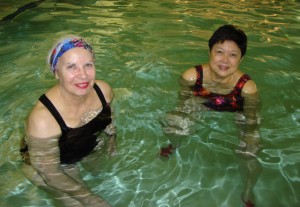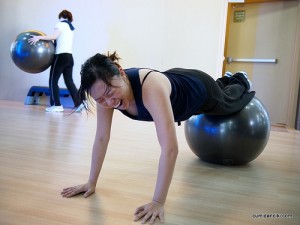by Michelle Sutton-Kerchner
You perfected your healthy lifestyle. You exercise, eat well, make time to relax. Some days you actually meditate–while using aromatherapy! (Okay, maybe not.) Soaring from the good life, your mission is to convince others of healthier choices. But, did they ask for your advice …
Everyone has that special person in life who, with the best intentions, tries to “show you the way.” They know why your weight loss stalled. They have a better workout schedule. They recognize the culprit to your high cholesterol by a mere glance on your plate.

Call them “fitness buff wannabes.” Perhaps there is an inner personal trainer trapped inside their suited corporate-tycoon exterior. Maybe they are a loved one with sincere wishes for your improved health or self-esteem. Whatever the cause, these people are out there with hands-on advice at the ready, and sometimes a garbage pail for dumping your stray unapproved snacks along the way.
Back Off, Please
Caught up in the energy and positive results of a healthy lifestyle, people often can’t help themselves. They want to share it. Many of the Center’s staff have chosen this industry to help improve others’ lives through what they realize as an invigorating journey. Group Fitness instructors often credit their decision to teach from a desire to help others experience the many benefits they have already gained.
As soon as we discover a helpful app or a new granola bar, we are eager to tell. Of course, we want to advise on the bigger issues: how to lose weight, diet, and get a better night’s rest. Why stop there! Indicate pitfalls and how to avoid them. Tell why broccoli is no longer smart when smothered in butter and cheese.
Sound familiar? Is this you? Drill Sergeant, it might be time to rethink your “helpful ways.” Although excited to have others enjoy better health, you probably don’t have all the answers. Your motivation may be driven by fear. A partner’s heart condition or unhealthy weight can loom over their beloved more than themselves. This does not make you an authority. You may have just enough information to make you a troublesome danger.
How to Help
Be a friend who only gives advice when asked. Your path takes you to your “happy fitness place,” not necessarily that of your loved one. What works to keep you on track, treadmill, or cycle may not prove successful for others. When you do offer solicited advice, be sure to share options beyond your own choices for a healthy lifestyle.
If you don’t know much about Group Fitness because you spend your time on the Exercise Floor, offer to research it with your fitness wannabe. Check out class descriptions on the Center’s Web site or speak with an instructor. (It might be a chance to refresh your own routine.) Take this opening to explore options, but know your boundaries. This is not the time to plan a couple’s triathlon or nightly workout routines. An overzealous response can trigger a retreat back to the couch for those in initial stages. Approach slowly and with caution so as not to overwhelm.
The same rule applies to helping your beloved eat a better diet. Respect is key. Avoid offering your opinion on the sensitive subject of appearances. Those who are overweight are very aware, thanks to our Photoshopped society and cultural emphasis on extreme thin. Noting those extra few pounds or criticizing that serving of dessert is unconstructive. Shame never drove someone to a workout. Quite the reverse.
Insecurities often abound in these situations, leaving the person less likely to make the healthy choices deserved. In reality, it may send someone to a plate of cookies. Worse yet– the cookies can no longer be enjoyed under these circumstances and the scrutiny of eyes attached to a svelte body.
Weight loss is a physical and emotional journey, with struggles and stumbles along the way. Your words and actions have a huge impact. Be supportive. If a friend or loved one shares s/he is trying to lose weight, this is not an invitation to comment on his/her appearance. Reasons for weight loss vary. Many are motivated to drop weight for health reasons alone. Perhaps they’re happy in their skin, but need to improve their health or want more energy. Ask if they need anything, and avoid making dates centered around food.

Often, those on a weight loss mission come to terms with what needs to be accomplished. They may not always carry through– as even the fittest person can recall from his/her early days. Frequently, loved ones are equally affected by a dieter in the group. Eating is part of how we socialize and unwind– coffee shop visits, cocktails and snacks at happy hours, a festive dinner to celebrate.
Get creative in how you share time. Don’t be an ultimatum. Friends don’t make friends subject themselves to a bakery counter in order to see each other. A friend’s efforts to eat less or eat healthier should be commended. It’s probably a positive influence on you, too. Get together for a brisk walk, a light lunch at the park, a swim at the Center, or a Group Fitness class. Join small group personal training. Their decision to lead a healthier lifestyle does not exclude you. It simply offers new opportunities for togetherness.
Notice the Positive
An ideal way to encourage a healthy lifestyle is through positive reinforcement. Turn a blind eye to the occasional binge on junk food. Quiet the reproachful comments and smug attitude. We don’t have the right to comment on another’s choices. (Let he who never once succumbed to a donut shout the first reprimand.) Rather, give credit when you notice water chosen over soda or a workout over watching TV. Praise progress, and that new glow radiating from a healthier body and mind.
Unless you’re a registered dietician, it is not your place to list the ways your relative with high cholesterol has mis-loaded his/her dinner plate. When we think we know the latest findings on a cholesterol-free diet, new research is revealed. Case in point: the controversial egg.
Leave an encouraging note or give a pat on the back. Literally! Go for it. It feels good for both. You know what the post-workout body needs, offer it. How did you overcome feelings of deprivation when denying unhealthy cravings, everything from a lazy spell to a bag of chips? See if the same tactic works here. Invite, don’t enforce.
Encourage Courage
Lack of time is usually the excuse offered by those wanting, but failing, to exercise and maintain a healthy lifestyle. Yet, many don’t realize the strong link between eating and emotions. Dedication and planning helps make the time necessary for healthy choices, but those choices often slip from a day’s stressors and activities.
Fear plays a large role in the cycle of unhealthy behavior. Perhaps this is where you can truly help those you love achieve a better way of living. Share your experiences– including the negative ones– from when you were a newbie on the Exercise Floor. Admit you once didn’t know the difference between iceberg and romaine lettuce, a treadmill and an elliptical!

A first session on the Exercise Floor can be intimidating; how to handle equipment and free weights can render a beginner downright clueless. Be a coach to the best of your own knowledge. For all the rest, consult a personal trainer. We are not born with fitness manuals in our heads. Learning takes time and courage. One must overcome self-consciousness and the worry of injury. Guidance is needed to feel comfortable and confident embarking on this lifelong journey. Be the beacon.
Live the Life
Perhaps the best way to motivate is by example. Focus on living your healthiest life. Commit to a fitness program and way of eating that works for you. Be an inspiration to others. A successful role model speaks louder than words.
Sources
“10 Things Not to Say to a Dieter,” by Malia Frey at www.about.com.
“What Not to Say to a Loved One Who Just Won’t Exercise,” by Paige Waehner at www.about.com.
“Who Picks on You about Your Diet and Exercise?” by Paige Waehner at www.about.com.
Image Credits
Not listening: http://www.flickr.com/photos/studiobeerhorst/6268874114/
Women chatting: © Nicholas Sutcliffe at www.dreamstime.com.
Exercise ball: http://www.flickr.com/photos/cumidanciki/5163310087/
 Fitness & Wellness News Your Source for Fitness News, Wellness News, Health News, and Nutrition News!
Fitness & Wellness News Your Source for Fitness News, Wellness News, Health News, and Nutrition News!




